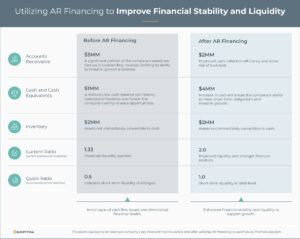Private equity (PE) firms invest in companies with high growth potential. Companies commonly leverage this capital infusion to fund expansion initiatives, such as scaling operations, entering new markets, or developing new products. However, to achieve sizeable growth, businesses typically require an enhanced working capital solution to maintain financial health, as rapid expansion can strain cash flow. In this context, accounts receivable financing is a preferred funding solution for increasing liquidity and stabilizing financial structures.
In this article, we examine the challenges of funding rapid growth and the role of accounts receivable financing to boost financial health as a company expands. A real-life case study is presented to demonstrate the effectiveness of accounts receivable financing in strengthening a company’s financial position and enhancing its attractiveness to potential investors for a second round of PE funding.
The Challenges of Funding Rapid Growth
PE-backed companies face a unique set of challenges when it comes to managing cash flow. While PE investment provides a substantial capital injection to support growth, rapid growth often outpaces the initial influx of funds and strains cash flow. As companies scale operations, they face increasing demands for working capital to support increased payroll burdens, inventory purchases, R&D, marketing, and sales efforts. A successful growth trajectory often requires a second round of financing to maintain momentum and reach new goals.
Conventional lending solutions can be slow and restrictive, hindering a company’s ability to capitalize on growth opportunities quickly. Traditional institutions and investors often require extensive financial documentation and collateral, which can be time-consuming and divert management attention away from core business operations. In addition, the restrictive loan covenants associated with conventional lending practices often prohibit further access to credit as the strain of growth is reflected in the company’s balance sheet.
A faster, more flexible funding solution is needed to maintain momentum and capitalize on the company’s growth trajectory.
The Role of Accounts Receivable Financing
Accounts receivable financing offers a flexible and efficient solution to bridge the cash flow gap between revenue generation and remittance. By leveraging accounts receivables as collateral, businesses can improve cash flow, accelerate growth, and enhance their financial profile.
Key benefits of accounts receivable financing for PE-backed companies include:
- Improved cash flow: By accelerating the speed of converting invoice receivables into cash, companies can improve their liquidity position, allowing for quicker reinvestment in growth initiatives.
- Increased operational flexibility: Accounts receivable financing is considered covenant-light compared to traditional lending. With fewer loan covenants, accounts receivable financing offers greater flexibility, allowing businesses to access more credit as their sales ledger grows. Additionally, this type of financing gives companies control over how funds are used, unlike traditional financing, which is often governed by strict financial ratios and benchmarks that can limit growth.
- Enhanced financial performance: Improved cash flow can lead to higher profitability and stronger cash flow from operations, making the company more attractive to investors.
- Reduced reliance on debt: Accounts receivable financing is a non-dilutive form of financing that preserves equity and improves the company’s debt-to-equity ratio.
- Accelerated growth: With access to additional funds, companies can invest in expansion, new product development, and strategic acquisitions.
Case Study: eCapital Partners with Hawaiian Bottled Water Company
To illustrate the effectiveness of accounts receivable financing for PE-backed companies, let’s examine a recent eCapital deal. A fast-growing bottled water company in Hawaii, backed by a PE firm, sought additional capital to support its expansion plans. The company aimed to increase production capacity, invest in new equipment, and pay down outstanding debts.
The bottled water industry is characterized by intense competition, high upfront costs for production equipment, and extended collection periods due to the nature of distribution channels. As a new entrant, the company faced challenges securing additional financing, as traditional lenders often require a proven track record and substantial collateral.
By partnering with eCapital, a leader in accounts receivable financing, the company was able to overcome these hurdles. The $15 million accounts receivable and inventory financing facility provided the necessary capital to fuel growth, allowing the company to invest in new bottling equipment, expand its distribution network, and increase marketing efforts. This cash infusion enabled the company to accelerate its market penetration and build brand awareness.
By establishing an accounts receivable and inventory financing facility, the company was able to:
- Pay down A/P and other debt: Improving the company’s financial health and reducing interest expenses.
- Invest in new equipment and capacity: Expanding production and meeting increased demand.
- Support ongoing operations: Ensuring uninterrupted business activities while pursuing additional funding.
The company strengthened its financial position by optimizing cash flow, enhancing its attractiveness to potential investors for the upcoming PE funding round.
Impact on the Balance Sheet
A robust balance sheet is paramount for companies seeking to raise capital. It serves as a financial blueprint, offering investors a clear picture of a company’s financial health, risk profile, and growth potential. Optimizing the balance sheet before a capital raise is crucial as it directly impacts valuation and investor confidence.
To illustrate the potential impact of accounts receivable financing on a company’s financial health, let’s consider a hypothetical example.
By reducing accounts receivable and increasing cash flow, accounts receivable financing can enhance several key financial metrics. A stronger current ratio and quick ratio indicate improved liquidity, making the company better equipped to support growth goals.
Moreover, a lower accounts receivable balance can lead to a higher inventory turnover ratio, suggesting efficient inventory management. This, combined with improved cash flow, can positively impact the company’s overall profitability and return on assets (ROA).
These financial improvements are crucial for attracting investors, as they demonstrate a company’s ability to manage its working capital effectively and generate strong returns. A healthy balance sheet, coupled with the positive cash flow generated by accounts receivable financing, can position a company for a successful capital raise and accelerate its growth trajectory.
Conclusion
For PE-backed companies, the goal is to maximize returns for investors. Accounts receivable financing can be a powerful tool to achieve this objective. By providing a steady stream of cash, companies can invest in growth initiatives, improve operational efficiency, and enhance their overall financial performance.
Furthermore, accounts receivable financing can help companies navigate economic downturns by providing a reliable source of funding. In times of economic uncertainty, access to working capital can be crucial for business survival and growth.
By strategically utilizing accounts receivable financing, PE-backed companies can supercharge their financial position, accelerate growth, and enhance their attractiveness to potential investors for a second round of PE funding.
For almost two decades, eCapital has evolved to become a leading provider of accounts receivable financing. Since 2006, eCapital has been on a mission to change the way businesses access the funding they need to reach their goals.
Contact us today to request a free financing consultation and see how we can help support your business expansion plans.
Key Takeaways
- While PE investment provides a company with a substantial capital injection to pursue growth, rapid expansion often outpaces the initial influx of funds.
- A successful growth trajectory often requires a second round of financing to maintain momentum and reach new goals.
- Accounts receivable financing boosts key financial metrics by reducing accounts receivable and increasing cash flow, making the company more attractive to investors by showcasing effective working capital management and strong returns.
- This article includes a real-life case study demonstrating the effectiveness of accounts receivable financing in strengthening a company’s financial position and enhancing its attractiveness to potential investors for a second round of PE funding.
ABOUT eCapital
At eCapital, we accelerate business growth by delivering fast, flexible access to capital through cutting-edge technology and deep industry insight.
Across North America and the U.K., we’ve redefined how small and medium-sized businesses access funding—eliminating friction, speeding approvals, and empowering clients with access to the capital they need to move forward. With the capacity to fund facilities from $5 million to $250 million, we support a wide range of business needs at every stage.
With a powerful blend of innovation, scalability, and personalized service, we’re not just a funding provider, we’re a strategic partner built for what’s next.





